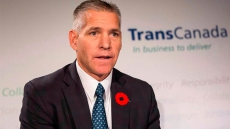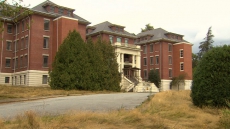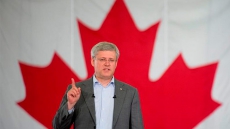OTTAWA — Canadian exporters stung by Russia's currency crisis and its retaliatory sanctions against the West wonder what 2015 will hold for a market filled with promise less than 12 months ago.
Companies from farm-equipment manufacturers to pork producers spent much of 2014 adjusting to the economic instability in Russia, a country that bought $563 million worth of Canada's agricultural exports in 2012.
For some firms, the first half of 2014 had the hallmark of a banner year — and then sales evaporated.
A senior executive for one of Canada's biggest exporters to Russia said his company did about $250 million in annual business there in recent years, mostly selling frozen pork products.
Olymel, a pork and poultry processor and distributor, appeared on track for its best year yet in Russia after more than two decades of working there, said Richard Davies, the company's senior vice-president of sales and marketing.
But in August, Russia banned meat products and other goods from countries such as Canada in retaliation for financial sanctions by the Western countries.
"We knew (the ban) was potentially going to come, but we certainly didn't expect it to unravel as quickly and as strongly as it did," Davies said in an interview.
"Obviously, the embargo in August had a significant impact on us and basically the Canadian and North American pork market, for that matter."
Last March, Canada and some of its allies sought to punish Russia for its annexation of Crimea and its provocative military activity in eastern Ukraine. They imposed a number of sanctions against Russia and its supporters.
Russia struck back by slapping a ban on meat, seafood, milk and dairy products, fruit and vegetables from Canada, the U.S., the European Union, and other countries.
The Canadian hog industry exported more than $490 million worth of pork products to Russia in 2012, according to Canada Pork International.
Signs of the impact have already begun to surface in the trade data.
The most-recent Statistics Canada figures show exports of fresh, chilled or frozen pork to Russia totalled $7 million for the months of August, September and October 2014. By comparison, the same three-month stretch in 2013 saw Canadian firms send $64 million worth of those products to Russia.
In another major area, Statistics Canada didn't record any Canadian exports of crustaceans to Russia from August to October 2014 after it yielded $16.1 million for the same three-month period in 2013. Canadian sales of frozen fish (excluding fillets) were $750,000 between August and October 2014, down from nearly $19 million over those months a year earlier.
Davies said the pork producers have redirected some of their products into existing markets, but that has driven down prices. He added that some 2014 losses were offset by price increases after a virus outbreak killed millions of piglets in the United States.
He has no idea what's next for Russian-Canadian trade, though he fears Ottawa's condemnation of Russia could hurt relations even if the sanctions are lifted.
Prime Minister Stephen Harper and Conservative MPs have been a vocal critics of Russian President Vladimir Putin for months. The Prime Minister's Office has said Harper told Putin to "get out of Ukraine" to his face when the two met at the G20 summit in Australia in November.
"My personal is view is it's just too loud, too much rhetoric for the political weight we carry in the grand scheme of things in the world political map," Davies said.
"I think long term that might have a negative impact when eventually things tend towards coming to normal.
"I think we might be in the penalty box for a little longer than we should."
A spokesman for Foreign Affairs Minister John Baird reiterated the government's message the sanctions against Russia and its supporters were made with "careful consideration of the potential impact they would have on Canadian business interests."
"We will continue sending the message to Russia that its aggression against Ukraine is unacceptable," Adam Hodge said in an email.
Today, the turmoil in Russia reaches far beyond international sanctions. The country's falling currency — the ruble — and the plunge in oil prices have thrown it into crisis.
The downturn has even affected sectors that were not targeted by the Kremlin's embargo.
"So, you were asking about business in Russia? There isn't any," said Greg Archibald, president of Saskatchewan farming machinery manufacturer Schulte Industries Ltd.
"We've built up some pretty good sales over there. Last year was a booming year and this year we were expecting to get better and then it just stopped."
Even though Russia hasn't banned farming equipment sales, Archibald said the country's economic problems have ensured Schulte hasn't sold anything in the country for six months.
The company, he said, saw half a million dollars in orders cancelled in one day. It has been working to boost sales in other markets, such as Germany, South Africa, China and Australia, he added.
Derek Lothian, vice-president of Canadian Manufacturers & Exporters, predicts the business challenges in Russia to remain in place for all of 2015 — at least.
Lothian said the situation has been compounded because the cash-strapped Russian government has also limited subsidies, particularly to its agricultural sector.
"Russia's purchasing power is, quite frankly, considerably diminished and that translates into dampened demand for Canadian products," he said.





